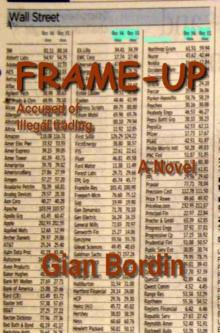- Home
- Gian Bordin
Frame-Up Page 2
Frame-Up Read online
Page 2
"Sir, I did not."
He looks at me for several seconds, slightly bending his head, as if he could penetrate my scull and scan the chemical connections in my brain to unravel the truth. "This is your final word?"
"Yes, sir. I’ve never engaged in any fraudulent trading of any sort."
Again, he remains silent for a while. "I hope you understand that I have no choice but to give the Ventura account to somebody else. Pass the entire dossier, including all electronic files, to Grant Hanson."
"But, sir, Signor Carvaggio hardly speaks English. He always insists on conversing in Italian."
"His English was good enough to abuse me." He dismisses me with a wave of his right hand.
I make a detour via the ladies’ room, to gain time, to compose myself, before returning to my desk. It takes me almost an hour to assemble all papers and send all electronic files on Ventura to Grant Hanson. Edward Long several times looks over the partition, wanting to know what I’m doing.
"Cleaning out, sheila? Did you finally get the sack? I’d be willing to help out, if you run short of money … obviously you understand, for a little service of an intimate nature." He expels his usual goat snigger.
By the time I’m finished, I see Hanson and Long walk past my cubicle, out for lunch. From the snippet of conversation I overhear, Hanson is telling Longs that Garland assigned him the Ventura account.
"How unfair!" Long exclaims. "It should have been mine."
I don’t catch Hanson’s response. I place the box of paper documents on his desk and then also leave for a bite at a nearby café, staying well clear of the pubs and bars in the City’s financial district frequented by most of my colleagues and other brokers. Again I wonder whether I will ever be fully accepted by them or remain no more than the firm’s token female stockbroker, a sop to the Securities and Futures Association’s call for greater gender equality.
Friday, 2:50 p.m.
Back at my desk after lunch, I ignore several of Long’s gibes. I’m just closing a small purchase order for a client when heavy footsteps, coming to a halt behind my chair, make me turn around. Two men stand at the entrance to my cubicle, one in the dark uniform of a constable, the other in a well-cut gray suit. Police? What now?
"Are you Miss Walker?" the one in mufti questions. His tone is polite and not unfriendly.
"Yes, I am."
"Miss Walker, I’m Detective Inspector Willis, and this is Police Officer Barlow. Will you please accompany us to the district police HQ to answer a few questions?"
I get up, my training in assertiveness, all part of Aikido, taking over. "Sir, am I under arrest?" It takes no guessing to realize that this is my boss’s doing. He didn’t believe me and reported it to the police. Although the general office culture accepts that insider trading — a broker illegally taking advantage of insider information to trade on his or her own account — that this occurs from time to time, everybody will deny any knowledge and distance himself or herself if you get caught.
"Not at this time. It is only to talk in an environment where we have more privacy."
And which is also more threatening goes through my mind. "We have a conference room along the corridor there where we can be alone."
"Miss, we prefer to interview you at the Snow Hill police station."
"All right. Let me just quickly log off."
Without waiting for his response, I log off, but leave the three screens updating share prices on, inform Maggie, our receptionist secretary, that I will be out of the office for a while, and then put on my jacket and retrieve my handbag from the bottom drawer of my desk. After a quick glance over my desk, I join the detective, the police officer trailing behind. Keeping my head high, I ignore the curious stares of my colleagues. Fortunately, Long has just gone out to the toilet. It spares me being the target for one of his snide remarks.
They have a car waiting on Lombard Street a few steps from our offices and drive me to the Snow Hill Police Station, several blocks west. I’m led into an internal interview room, which reminds me very much of the scenes on TV crime shows — a sizable room, well lit, somewhat shabby, bare walls, intentionally intimidating. Willis invites me to take a seat on one of the four metal chairs at the table in the middle of the room, chairs that must have been intentionally chosen for being uncomfortable, and leaves. Officer Barlow remains ominously next to the door. A microphone and a small electronic control unit stand on the table. Two closed circuit cameras are centered on me. A dark glass wall — a one-way mirror, I figure — reflects my image. I can just imagine a group of detectives standing on the other side, watching me, my every expression, my every movement, occasionally commenting on what they observe. The very thought of it feels intrusive.
About five minutes later, Willis returns in the company of a solidly built female officer whom he introduces as Detective Sergeant Somes. Her hooded gray reptile eyes stare devoid of any expression. I take an instant dislike for that woman. She asks if I would like a drink. I decline with thanks. Both take seats on the other side of the table, their backs facing the glass wall.
"Miss Walker, I guess you’re apprehensive," Willis commences. "Who wouldn’t be in your situation?"
Although said in a friendly, sympathetic tone, it sounds threatening.
"So, to put you at ease," he continues, "let me make clear that this is only an informal and preliminary interview. Hence, we will not record it. Do you nevertheless wish to have your lawyer present?"
I really don’t have anything to hide. My conscience is clear. I’ve done nothing illegal or unethical. Although I know that my father will chide me for not having insisted on the presence of a lawyer, I decide to play it by ear. "Not at this point. I may though wish to change my mind depending on the questions you are going to ask."
"Fine. Let us know if you do."
He first inquires about my background, my academic qualifications, my employment at Lewis Stockbrokers, and my functions. Then he broaches what I reckon is his real interest: "I understand that you are in charge of the Ventura Consolidated account. What does that imply?"
"To put the record straight, I was in charge of it. I’m no more. The account is now handled by one of my colleagues. Being in charge of an account simply means that the client always deals with the same broker who is thoroughly familiar with the needs of the client, his or her transaction history, the preferences as to the type of investments in terms of risk, diversification, industry, geographical location, and so on, rather than having to deal with several different brokers within the same firm. So I handled all buy and sell transactions for Ventura, provided them with investment advice, and, as part of that, made them aware of potentially attractive ventures."
"You also advise them if they should sell stocks they hold?"
"Yes."
"Why? Could you elaborate on that?"
"For instance, as recently happened, the number of new housing construction permits has taken a dive. This will most likely result in a slump in industries that manufacture building material. So the moment a conscientious broker discovers such a trend, she would advise a client who holds large parcels of shares in such industries to sell these shares and reinvest the funds in some more attractive industries."
"Isn’t this though insider trading?" questions Somes. "He would violate stock exchange regulations."
"No, not if she bases her advice and any subsequent transaction on publicly known information, such as the monthly report of new housing constructions permits." I purposely use ‘she’ again, just to make a point.
"But the advice you gave Ventura to sell the …," Somes searches through her notes.
"Sanvino shares," I suggest.
"Yes, the Sanvino shares. That was not based on publicly known knowledge," she asserts, frowning.
"The wine industry was aware that the Sanvino contract with Lufthansa is to expire shortly. There was also a rumor that the airline might dump Sanvino in favor of another supplier of Italian wines."
&nb
sp; "But that is insider information, so acting on it is illegal," she continues rather aggressively.
I almost laugh. I seem to be facing the stereotype duo of a benevolent and a nasty interrogator. But I also realize that she is way out of her depth. Or is she only feigning and if so what is she aiming for? "Rumors, by definition, are public information," I counter.
A fleeting frown of annoyance crosses her face. "Since you knew of that, you must surely also have been aware of the other, that Sanvino was going to get the Singapore Airlines contract."
"No, I did not, and if you persist in this sort of aggressive questioning, I insist that I have a lawyer present." I’m not going to be bullied by this woman.
Willis casts her a brief glance — is it a warning, I wonder? — and then says: "Look, Miss Walker, the stock market is always a bit of a mystery to most outsiders, so, please, don’t take our questions wrong. Enlighten us. When did you learn that Singapore Airlines was considering signing with Sanvino?"
His use of language hints that he knows more about the dealings in the stock market than he lets on. "Yesterday morning, about ten o’clock, when it was announced on Reuters’ electronic newsflash our firm subscribes to. You can easily check this out. It was the first public announcement posted on the Web on this matter."
"So, you claim that this was the first time you heard of it?"
"Yes. If I had been aware of this contradictory rumor the day before, I would hardly have advised Ventura to sell. It does not look good on my record to have given Ventura advice that turns out to be bad the next day. And since we are talking about that advice, I had the rumor that Sanvino was going to lose the Lufthansa contract checked out with a reliable source at another stockbrokerage firm and got it confirmed. So I acted with due caution."
"Would you be willing to name that source?"
I hesitate for a moment. Should I pass on such information without consulting a lawyer? What if they check with Gary? He might blame me for being questioned. Furthermore, I overstated my case by claiming a ‘reliable source’. I don’t know Gary’s informant inside Goldsax. But again, I reason that I’ve nothing to hide. "Yes. My initial contact was Gary Buxton at Goldsax."
So far they haven’t brought up Carvaggio’s accusation. Is this only a fishing expedition and the end of the interview? My hopes are quickly dashed. Willis takes me once more through the Sanvino transaction, this time painstakingly step by step, including the timing of each aspect.
It is close to five before I come out of the Snow Hill Station. As I walk back to the office, I wonder what will happen next. I try to reassure myself that I have nothing to fear since I have committed no crime. The worst that can happen, has already happened, is that my reputation as a stockbroker is in tatters.
By the time I reach my desk, the office is empty. Friday. All my colleagues have left early for the weekend.
Friday, 7:30 p.m.
Gary and I agreed to meet at Il Corno d’Oro, my favorite Italian restaurant in South Kensington. Last night, he was very supportive when I told him about the Sanvino debacle, although I sensed that he was concerned that Garland guessed who had confirmed the rumor about the Lufthansa contract likely to be dropped.
"Look, you acted cautiously," he reassured me then. "You were just unlucky and nobody can blame you for that."
And that night I really needed his comfort. Even the meeting of our bodies, soothing in its gentle familiarity, offered comfort. He is a considerate lover. I like his body, the smell of him. Maybe he isn’t the most exciting lover I’d ever had. He is a creature of habit, lacking a sense of sexual adventure, sticking to the familiar, but then our jobs keep both of us under constant pressure, which takes a deliberate effort to shake off.
My thoughts last night before sleep quieted my mind were that maybe we were good for each other, not only in companionship, but also in our shared interests. I even liked his parents, particularly his mother, and the one time he accompanied me to Switzerland, he seemed to get along well with my relatives, except for Carlo whom he dismisses as a druggie. I suspect that there may be some jealousy of my closeness to my brother.
Maybe I should explore his feelings about getting married. I’m twenty-six and want to have a child or two before reaching thirty.
So now I’m looking forward to another pleasant evening with him. Good food and a nice drop of wine first, then a bit of dancing at a disco and finally to bed in my apartment. Rather than wait outside the restaurant, as he usually does unless it is raining, he is already sitting at the bar with a half-finished drink, whisky by the looks of it, rather untypical for him. I immediately sense that something is wrong. No hello or pleased smile greeting me. I offer him the customary three kisses into the air next to the cheeks. His response seems perfunctory, reluctant.
"What are you drinking?" I query, wondering if I should order the same.
Ignoring my question, he asks in a sulking tone: "Why did you have to give the police my name? Couldn’t you have kept me out of this affair?"
I’m rather taken aback. "DI Willis has already contacted you? I’m sorry."
"No, it was a woman. What a bitch! She wanted to know who had confirmed the rumor about Sanvino. It’s bad enough that I’m now involved. But I don’t want that other people at work are also questioned by the police."
I spot Silvio, the restaurant’s manager, behind the kitchen counter, giving orders to his two chefs. When I first returned to London four years ago, it was his flair as the head chef that established the restaurant’s fame as one of the best Italian eating places in London. It is always full of local Italians and one hears more Italian than English. Since taking on the role of manager as well, he mainly supervises the food preparation. Seeing me, a broad smile lights up his face, and he comes around the counter to greet me. "Ciao bella. A Barbaresco, as usual?"
I return his flirting smile. "Yes Silvio, please." Il Corno d’Oro only serves the real thing, not simply generic brands. Turning back to Gary, I reply: "Gary, I’m really sorry. They questioned me in detail on the whole matter and when I said I had the rumor confirmed at Goldsax, they wanted to know my contact there. What else could I do? But even if I had withheld your name, they would have had little difficulty in finding out. Both Long and my boss knew."
Silvio places the glass of wine on the counter. He bends forward with a conspiratorial smile and murmurs in Italian: "Don’t let your lover’s shitty mood spoil your enjoyment." He turns away with a wink. I take a sip and savor the silky taste of the liquid.
"Why’s that guy always flirting with you? What did he say?"
"Oh nothing. Just that I should enjoy the wine."
"He’s far too forward. Why does he have to speak Italian?"
"Come, Gary. He’s Italian and Italians simply love the sound of their own language. Nothing else."
In fact, it’s true that Silvio always flirts with me, and I enjoy it, often respond to it. Like myself, he takes great care of his body, keeping in shape. I suspect that it’s more than simply flirting on his part, particularly if I come alone or with Carlo. He always offers me little extras. A second glass of wine free; nibbles; a small complimentary platter of cheese. He sometimes even makes it a point to wander over to my table for a chat. And he has asked me out more than once, but I’ve always gently refused.
"Your trouble really catches me at the wrong time," Gary resumes his complaint. "You knew my name was put forward for promotion to senior. Even a whiff of a scandal can sink me. If I don’t get it now, it could be years before another senior position comes up. I wish you’d kept me out of this. I’m really pissed off."
I’ve already said twice that I’m sorry. A third time will hardly make any difference. He is exaggerating, is my defensive reaction. Why should a bad deal at another stockbroker affect his chances for promotion? Is he already looking for a scapegoat in case he misses out? Or is he simply trying to forestall any potential accusation that it was his advice that landed me in trouble. That thought hasn’t even occ
urred to me until that moment. I find my own reaction uncharitable.
"Look, Gary. Neither you nor I did anything wrong. Let’s not let this thing —"
"It’s easy for you to talk," he interrupts. "It isn’t you who’s now at risk. If this reaches the wrong ears I can kiss that promotion goodbye."
He is exaggerating, but he also raises my hackles. "What do you mean, it’s easy for me to talk? I just happened to be grilled for almost two hours by the police. And who knows what will happen next? Garland needs a scapegoat to placate Ventura, and it looks like I’m it. So I’m in deep shit, as Long took great pleasure in telling me repeatedly."
He has the decency to blush. "I know. I’m sorry. I didn’t mean it that way. It’s all just happening at the wrong time." He looks away embarrassed and then empties the rest of his whiskey in one go.
"Gary, come, let’s enjoy this evening and not have it spoiled by this matter. There’s nothing we can do about it tonight," I plead.
He sighs. "All right."
I signal to Silvio who guides me with a light touch on the shoulder to our reserved table in the dimly lit corner of the restaurant. Over the meal, we both indeed make an effort, but our interactions lack the usual spontaneity. We drink rather more than our normal quota. When I suggest going to a disco, Gary’s bad mood resurfaces. He’d rather be distracted by the latest James Bond movie, he replies. Reluctantly, I agree, although I hate the supercilious dialogue of these movies, the ridiculous sexual games, the implausible script, and the graphic violence. All these people getting killed off. The interminable sequences of fistfights. Nobody can get knocked about for several minutes, as Bond does, and then walk away, only needing to straighten his cravat and brush dust off his sleeves. Maybe these films are supposed to be spoofs, but they are not my type of satire. So I endure the violent fights, the unnecessary shoot-outs and the unerotic bedroom scenes of strategically crumpled up shiny sheets, while my mind is going over what happened these last three days, as well as Gary’s adverse reaction this evening.

 Chiara – Revenge and Triumph
Chiara – Revenge and Triumph Kidnapped and a Daring Escape
Kidnapped and a Daring Escape Yuen-Mong's Revenge
Yuen-Mong's Revenge Frame-Up
Frame-Up Summer of Love
Summer of Love